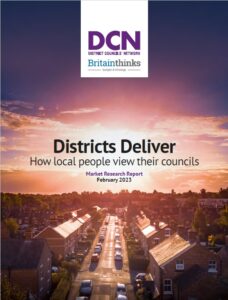Exclusive research has revealed unprecedented insight into the value people place on universal local public services and their trust in the councils providing them.
The District Councils’ Network (DCN) commissioned the independent analysts BritainThinks to survey people living in the English shires about their attitudes to the local public services in their area.
BritainThinks’ polling makes clear the significant perceived value of services such as waste collection, street cleaning and leisure services which are open to all residents but have sometimes been neglected in the national debate about local government.
Waste collection was the single most valued service, with 92% of people considering it essential.
| % of respondents who consider service area essential or very important | |
| Waste collection | 92% |
| Street cleaning | 85% |
| Housing | 79% |
| Economic development | 74% |
| Planning | 69% |
| Leisure and recreation | 67% |
The survey of 1,000 people living in English shire areas with both district and county councils also revealed a significant level of public backing and trust in district councils.
The survey revealed greater name-recognition for district councils – the most localised principal authorities – than for the far larger county councils, with 59% of residents being able to identify their district, compared to 32% their county council.
Fifty-four percent of people expressed satisfaction with their district council, compared to 46% for county councils. Meanwhile, 63% of people described their district council as high-quality.
Districts were more trusted to boost local pride, bring local people’s views into decision making, tackle social issues and respond to local emergencies than county councils or national government.
| District council | County council | National Govt | |
| Helping people to feel proud of their local area | 66% | 28% | 6% |
| Bringing the views of local people into decision making about my local area | 62% | 32% | 6% |
| Tackling social issues in our
Neighbourhoods |
62% | 31% | 8% |
| Responding and dealing with emergencies in the community | 51% | 39% | 10% |
These findings come a month before 17 district councils are to be abolished in Cumbria, North Yorkshire and Somerset, to be replaced by far larger and more remote unitary authorities.
Cllr Sam Chapman-Allen, chairman of the DCN, said:
“While there has been an understandably heavy focus on the work of social care departments in the national debate about local government, a sense of the broader role of councils and the immense value of their most well-used services has been under appreciated.
“Most district council services are universal, with all residents benefitting for instance from leisure facilities to keep people healthy, environmental services to make places green and pleasant to live in, our economic development work to secure prosperity and growth, and our unique ability to connect with and support those people in most need of help.
“Our services are visible to every single resident – they shape places; they help bring about health, prosperity, fairness and compassion; and our proactive social intervention lessens the burden on the NHS and other parts of the public sector. These services are perhaps better understood and appreciated by the local people who use them and rely upon them than by Westminster or Whitehall.
“The results of this research are an endorsement of the scale of district councils. We are the most localised principal authorities – our boundaries are for the most part built around easily-identifiable market towns, seaside communities, new towns and cathedral cities. We are genuinely local government.
“The fact that we are close to all our residents helps us win trust. Our localised nature gives us a unique convening power to pull together local people and to channel our collective energy towards moving our places forward. This often means we are best placed to drive change.
“But this research also reaffirms that local government in two-tier areas works. Residents recognise the different strengths of district and county councils.”
Ben Shimshon, Co-Founder and Managing Partner, BritainThinks, said:
“The picture of district councils that emerges from this research is of a well-understood, locally focussed and largely effective provider of services that matter to local residents.
“Whilst there is always room to improve – and almost a fifth of residents express some dissatisfaction with the performance of their council – this research demonstrates that district councils are working from a strong base, with majorities of residents feeling that they have the interests of local communities at heart, that they deliver services that matter for their community, and that their areas would be worse off without their district council.”




